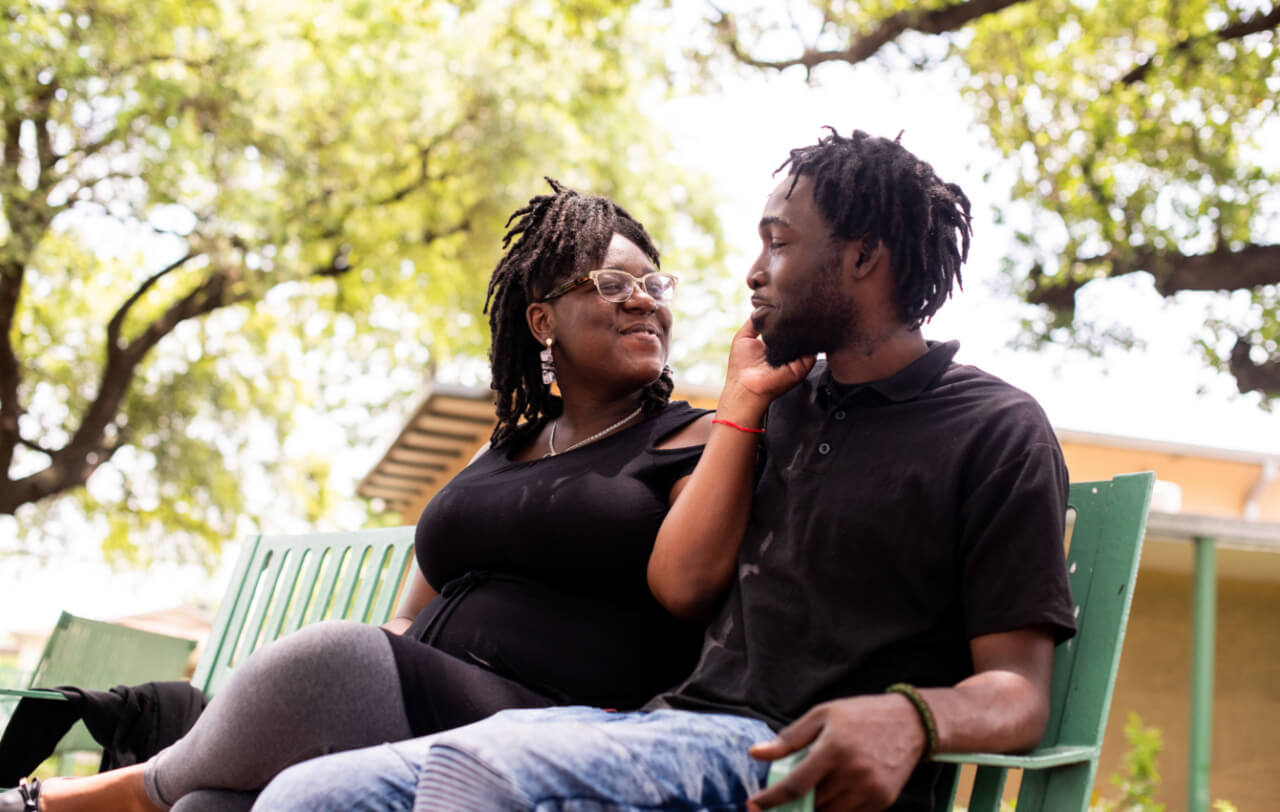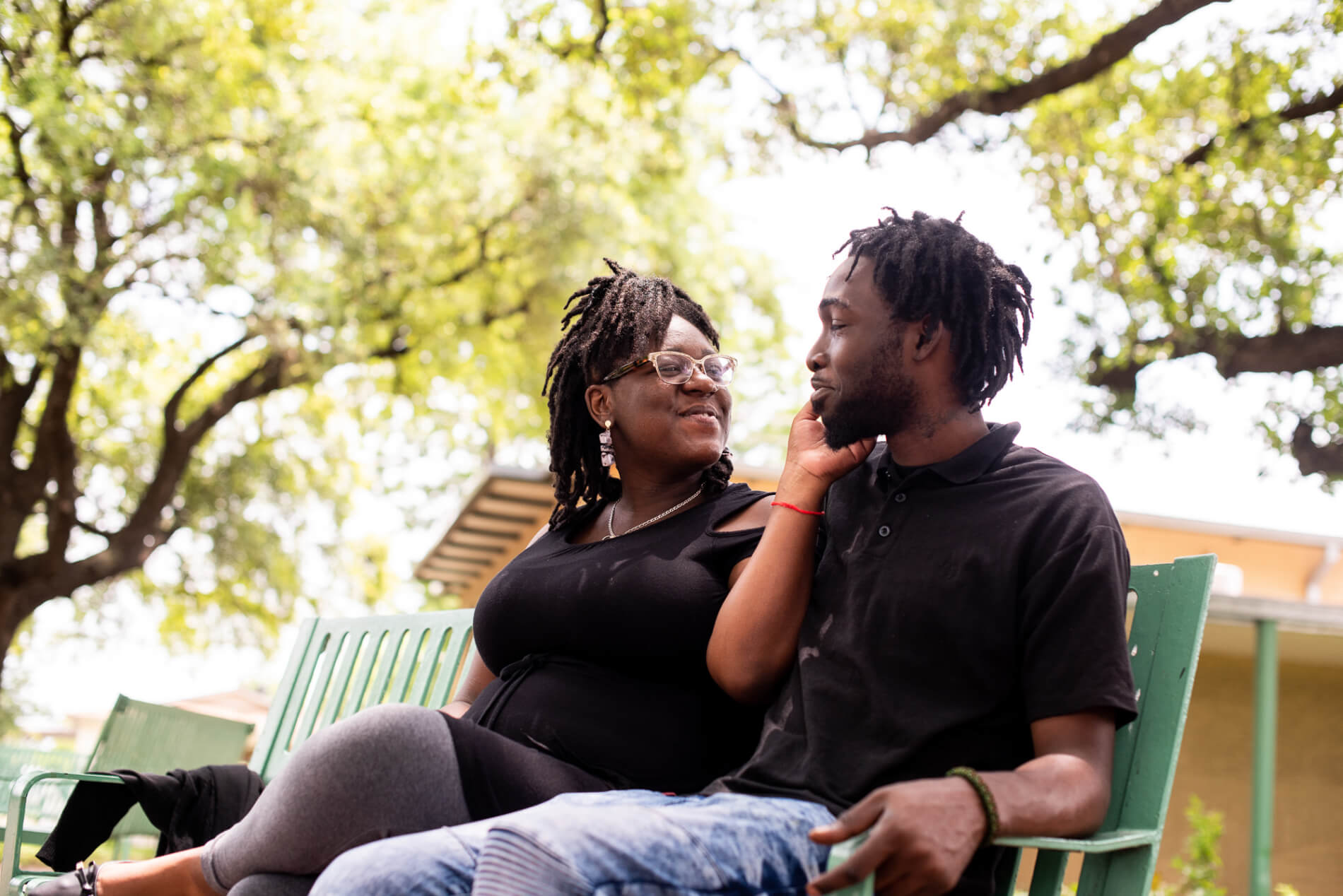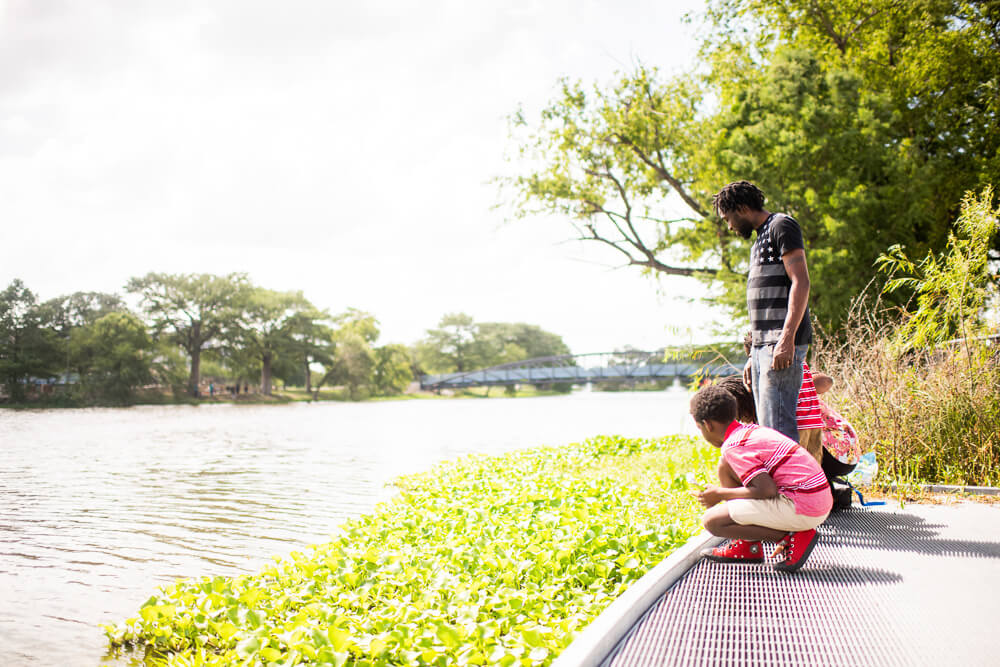


Shanicka was pregnant with her first baby at 17, before high school graduation, and Danzel has a daughter with an ex-girlfriend. They have one more kid together, with another on the way, and rely on a nearby charity to help with child care. Danzel has a petty crime record he’s working to put further and further behind him: “I haven’t been in trouble for 10 years,” he says.
Chances are, their lives don’t sound much like yours.
But ask them what pressures they’re facing day to day, and you get the most relatable reply in the world:
“Mostly, it’s schedules,” Shanicka says with a laugh. “Everybody’s got a different schedule.” Four-year-old Tristan is out of school at 2:30 p.m., and nine-year-old Jabree is done at 3:30 p.m. Shanicka, 28, is grinding out a degree in business at Texas A&M-San Antonio. Danzel, 31, holds down the jobs he can find for as long as he can while juggling everyone’s schedule with one car and limited gas resources. “There just ain’t enough time in the day.
I tell them I have three kids of my own, in three different schools, across two different parts of town, and my wife and I both work. “Ah, so you get it,” says Danzel, and I do. Some things in life are the same no matter your color or creed or ZIP code.
But in recent weeks, over a series of conversations, Shanicka and Danzel shared more details about their lives, and the experience of listening to them was remarkable. It’s tricky to be vulnerable with a stranger, or even a new friend. It takes trust and courage to talk straight about money and healthcare, and why your life is one way and not another. But Shanicka and Danzel were game. They say it’s worth the uneasiness and the risk, because it’s good for us to try to understand each other’s lives.
Those conversations reminded me that people are people and parents are parents. But they also taught me surprising details about the challenges of overcoming a lifetime of disadvantage. Both were born into families experiencing economic hardship and all that comes with it: unstable homes, under-performing schools, and a sense that family and neighborhood histories repeat themselves.
In 2018, Shanicka and Danzel attended Laity Lodge Family Camp during a Partnership Weekend. That’s what we call special Family Camp retreats that happen a few times a year where we partner with an organization in San Antonio or Austin that serves families living on the margins. They’ve also been through Resilient Kidz, a parenting class we support through organizations like the Good Samaritan Community Center on San Antonio’s West Side, one of the lowest-income urban areas in Texas.
Shanicka and Danzel say that Resilient Kidz class was the first time they had really talked to other parents.
“We’re pretty much alone,” says Shanicka. Danzel’s family is in Mississippi, while hers is just over on San Antonio’s East Side, but “everyone is grinding; everyone is busy,” and they do not have many supportive relationships.
When they met fellow parents through Resilient Kidz, “there was a lot of, ‘Oh, your kids do that too?’” says Danzel. “It’s just good to know other parents go through the same stuff you do.”
I ask whether they’ve stayed in touch with the parents they met in the class.
“We tried,” says Shanicka. “It’s hard when our phones are always different. Our numbers are always changing. You know?”
I admit that, no, I do not know: “Why does your phone number change?”
Shanicka and Danzel tell me about how communication basics like phone and internet work in their lives. The cell phone providers don’t lock them into contracts (like they tend to do for you and me) but offer one-month plans. You pay, your phone stays on. You miss a payment, and your phone turns off. When you can afford to pay again, they give you a new phone number.
Think for a minute about all that depends on your phone number, and you can imagine the stress this creates.
“I’ve been trying to look for a job,” says Shanicka. Potential employers haven’t been calling, and “I’m like, did they get the old number?” Or, “a lot of places, they verify who you are with your phone number. So when they ask me, I [make up numbers]—uh, 6-6-7-7….” She laughs.
“Even in stores when they ask for your number“ to set you up for discounts, Danzel says, “our number is never the same. So we never get to take advantage of those offers.”
“Before we found out I was pregnant,” says Shanicka, “my number had been off for about four months. I would miss phone calls from the school. They just said recently that [my son] has severe sleep apnea, and they had called me to schedule appointments for the referrals. I missed those. I was like, ‘Oh god, now I’m pregnant, I can’t miss those appointments, too.’ So I had to use the little amount of money I had to go cut my phone on, but I don’t know if it’s going to be on long.”
Danzel has had a phone in the past. “But right now,” he says, “I think it’s more important for her to have one.”
They share about all kinds of things: having to take two buses to get to church on Sundays; how the amounts they get for food stamps and housing assistance fluctuate automatically when they earn a bit more money one month; the challenge of seeing a doctor; the challenge of putting protein on the dining table—“We eat a lot of sides,” says Shanicka.

Shanicka and Danzel are not complaining. They laugh their way through telling me about many of these things. Yes, they’re caught up in an incredibly complex struggle of life, just like millions of other Americans living in areas with limited opportunities.
But theirs is not a tragic story. It’s also not a success story. It’s not a story of failure. It’s not a story about how one of our Foundation programs helped a family overcome. It’s not anything nearly that simple.
This is a story that has not yet found its ending, and it’s the kind of story we’re trying harder to attend to. A story that is midstream, in motion, about a family that is battling it out, a day at a time, a story whose primary job is to help us better understand the lives of our neighbors.
With the help of Foundation scholarships, Bonham Academy lets the Frio River Canyon be their classroom during their first Outdoor School retreat.
For 40 years, the Texas Outdoor Education Association has gathered in the Frio River Canyon to enhance its mission.
This border community has been bringing groups to the Canyon two or three times a year for 49 years running, driving dozens of kids in packed school buses 10 hours through the night.